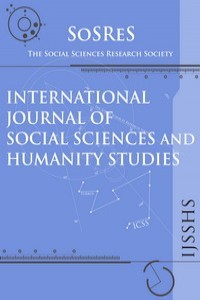GEOPOLITICS OF CASPIAN OIL AND GAS
GEOPOLITICS OF CASPIAN OIL AND GAS
___
- Aydın, Mustafa (1999), “Regional Security Issues and Conflicts in the Caucasus and the Caspian Regions”, (in: Kurt R. Spillmann and Joachim Krause- Ed, Studies in Contemporary History and Security Policy Vol. 3), Bern: Peter Lang, pp. 117- 139.
- Cornell, Svante, Mamuka Tsereteli and Vladimir Socor (2005), Geostrategic Implications of the Baku-Tbilisi-Ceyhan Pipeline, Washington D.C.: Central Asia-Caucasus Institute and Silk Road Studies Program (CACI-SRSP), John Hopkins University.
- Emadi, Seyed Emed and Hameed Nezhad (2011), Energy Market for Caspian Sea Oil and its Supply, International Black Sea University Scienetific Journal, Vol. 5, No. 2, pp. 21
- Estrada, Aurelia Mané (2009), Central Asia: Moving Towards Alternative Vision of
- Energy Relations, Elcano Royal Institute, Asia-Pasific/ Central Asia Observatory Working Paper 56, Madrid: Elcano Royal Institute. Finley, Mark (2012), The Oil Market to 2030: Implications for Investment and Policy,
- Economics of Energy and Environmental Policy, Vol. 1, No. 1, pp. 25-36. Fontevecchia, Agustino (2012), Stick with Oil: Natural Gas Prices Still Too Far From
- Covering Production Costs, Forbes Magazine, http://www.forbes.com/sites/afontevecchia/2012/07/23/stick-with-oil-natural-gas-prices- still-far-from-covering-production-costs/ (Accessed 1. 9. 2012)
- Haas, Marcel, Adrej Tibolt, Vincent Cillesen, (2006), Geo-Strategy in the South
- Caucasus, The Hague, Netherlands: Institute of International Relations. Hussain, Nazir (2010), The Dynamics of International Energy Dependence: A
- Comparative Analysis of the Gulf and Caspian Oil, , Islamabad: The Institute of Strategic Studies. Indexmundi, http://www.indexmundi.com/commodities/?commodity=crude-oil- brent&months=300 (Accessed September 12, 2012).
- International Energy Agency (2008), World Energy Outlook 2008, http://www.iea.org/w/bookshop/add.aspx?id=353, (Accessed 8. 8. 2012)
- International Energy Agency (2009), World Energy Outlook 2009, http://www.iea.org/W/bookshop/add.aspx?id=388 (Accessed 8. 8. 2012)
- Marketos, Thrassy N. (2009), Eastern Caspian Sea Energy Geopolitics: A Litmus Test for the U.S. – Russia – China Struggle for the Geostrategic Control of Eurasia, Caucasian review of International Affairs, vol. 3, No. 1, pp. 2-19.
- Milliyet (2008), BTC Hattındaki Patlamayı PKK Üstlendi, http://www.milliyet.com.tr/Guncel/HaberDetay.aspx?aType=HaberDetay&Kategori=gun cel&ArticleID=976046 (Accessed, 7. 7. 2012).
- New York Times (2006), Blasts on Gas Pipeline Send a Message, http://www.nytimes.com/2006/01/24/world/europe/24iht-georgia.html?_r=0, (Accessed, 7. 2012).
- Nye, Robert (2005), Soft Power: The means to Success in World Politics, Canada: Public Affairs.
- Olcott, Martha Brill (2010), Central Asia’s Oil and Gas Reserves: To Whom Do They
- Matter?, Global Journal of Emerging Market Economies, Vol. 2, No. 3, pp. 257-300. Paillard, Christophe- Alexandre, (2006) “Rethinking Russia : Russia and Europe’s
- Mutual Energy Dependence”, Journal of International Affairs, Vol. 63, No. 2, pp. 65-84. Pipinashvili, David (2011), Sino-Russian Geopolitical Interest in Central Asia and South
- Caucasus, Bulletin of the Georgian National Academy of Sciences, vol 5 no 2, pp. 144- Radio Free Europe, RFL/ RL Newsline (2006), Sabotage in North Caucasus Disrupts
- Energy Supplies to Georgia, Armenia, http://www.hri.org/news/balkans/rferl/2006/06-01- rferl.html, (7. 7. 2012).
- Tomberg, Igor (2008), Impact of Five-Day War on Global Energy, http://www.globalresearch.ca/index.php?context=va&aid=10042 (Accessed 28. 7. 2012).
- Tsereteli, Mamuka (2009), The Impact of the Russia Georgia war on the South Caucasus
- Transportation Corridor, Washington D.C.: Jamestown Foundation, http://www.jamestown.org/programs/recentreports/single/?tx_ttnews[tt_news]=34654&tx
- _ttnews[backPid]=7&cHash=54b53bf6cc (Accessed, 2. 9. 2012).
- Zhengang, Ma (2009), A Brief review of current international situation and China’s
- Diplomacy, China International Studies, Vol.15, No. 2, pp. 4-15. Zhuanghi, Sun (2007), “The relationship between China and Central Asia”, (in: I. Akihro- Ed., Eager eyes fixed on Eurasia), Sapporo, Japan: Slavic Research Center, Hokkaido University, pp. 41-63.
- Başlangıç: 2009
- Yayıncı: Sosyal Bilimler Araştırmaları Derneği
UNBLOCK ARGUMENTS IN MALAYSIAN SOPOBLOGS
Sharifah Shahnaz Bt Syed HUSAİN, Hawa ROHANY, Noorzan Haji Mohd NOOR
THE POST 9/11 DEMOCRATIZATION IN AFGHANISTAN: CHALLENGES AND EXPECTATIONS
PROTECTION OF CHILDREN IN MALAYSIA THROUGH FOSTER CARE LEGISLATION AND POLICY
Azizah Mohd, Nadhilah A. Kadir
EMPLOYABILITY PROGRAMMES AND GRADUATES’ ASSESSMENT OF THEIR EMPLOYABILTY
Shukran Abd RAHMAN, Hariyati Shahrima Abdul MAJİD, Ainol, Madziah ZUBAİRİ, Danial Mohd YUSOF, Mohd. Feham GHALİB, Mariam Adawiah DZULKİFLİ, Nazariah Shar'ie JANON, Munir SHUİB
THE CONCEPT OF PROFESSIONAL IN THE NEW CIVIL CODE
Narcisa Mihaela STOİCU, Sorin FİLDAN
SUBJECTIVE LIFE SATISFACTION AMONG URBAN MALAY CIVIL SERVANTS IN MALAYSIA: A QUALITATIVE STUDY
Nor Hafizah Mohamed HARİTH, Hazizan Md. NOON
COMMUNICATION AS A FORM OF PLURALISM
SARTRE’S CONCEPTION OF ART GROUNDED ON HUMANIST EXISTENTIALISM AND PHENOMENOLOGICAL ONTOLOGY
